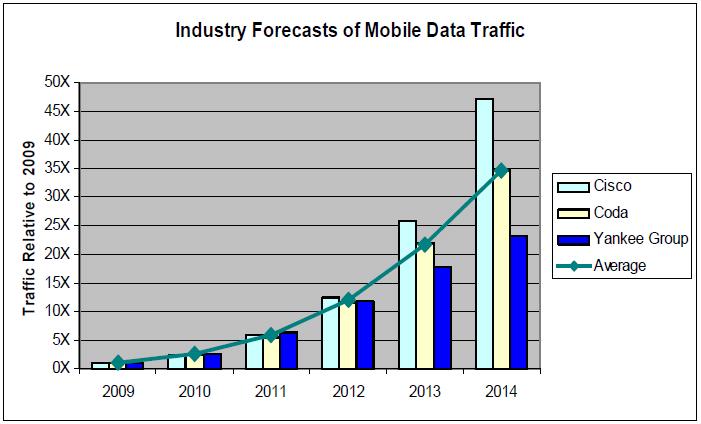The FCC relies on Cisco’s forecast of mobile-broadband data demand as a basis for spectrum policy. Called the Visual Networking Index, it comes up many times in the National Broadband Plan, in other documents, and in speeches.
There is overlap between the people who prepare the forecast and the people responsible for marketing Cisco’s line of core-network hardware to service providers. The forecast is used to help sell that hardware. Put simply, it’s a sales brochure. For business purposes, that’s fine. We look at marketing materials all the time, get useful information from them, consider the source, and make a decision. In spectrum policy, we’re not doing that. We’re taking Cisco’s claims as-is, and not considering how the company’s interest in selling hardware might influence its forecast, let alone critically and openly examining the assumptions that go into the forecast.
The Commission should rely more heavily on two forecasts in its possession that, unlike Cisco’s, are independently prepared. One is by Yankee Group and the other is by Coda – both independent research firms. These two forecasts are cited, along with Cisco’s, in the FCC’s October 2010 Technical Paper, Mobile Broadband: The Benefits Of Additional Spectrum. A chart from the report comparing three forecasts is shown below.
As with any sales pitch, whenever you hear a spectrum claim, consider the source.

Why not rely on the actual expectations from AT&T and T-Mobile instead? AT&T says 8-10 times growth in the next five years (2010-15). T-Mobile said (in January) 60% CAGR from 2009-14 (i.e. 10 times in 5 years). Both are a lot lower than even Yankee and Coda (and AT&T certainly has no incentive to underestimate future traffic growth).
AT&T’s real numbers are also quite a lot lower than Cisco’s data for 2010 (adjusting for market share in North America) and dramatically lower for 2015.
You could argue that AT&T grew early so its future growth will be slower than the market as a whole, but surely not half or a third the speed of the overall market when AT&T is ~40% of that market in 2010?
Also note that taking an arithmetic mean of the three forecasts (as the FCC did) is inappropriate – it should be the geometric mean if we are talking about growth rates.
Tim has an interesting follow-up here:
http://tmfassociates.com/blog/2011/04/07/how-wrong-is-cisco/